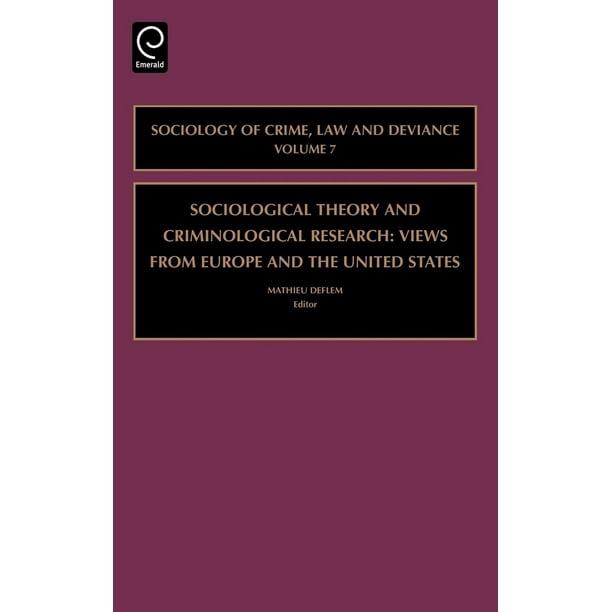Sociology of Crime

Extracts from this Sociology of Crime Introduction Causes of Crime For centuries, the one plague that human civilization faces is a disease that has no evident cure - crime. Before one can even try to puritan women solutions for it, one must understand what a crime is and the nature of crime. Crime itself is defined as any offence harmful against society. The nature of crime however deals with the motives and causes of crime, which has no one clear cut explanation. There are several different theories on the cause of crime such as heredity, gender and mental defects, but each one is not substantial enough to explain crime and why it takes Sociology of Crime. The theory on heredity as being the source of crime is based on the idea that criminal activity is predisposed by human genes. Gender being the root of crime suggests that testosterone, the male hormone that causes aggressive behaviour is encouraged in male-dominated societies, thus leading to criminal behaviour.

Both heredity and gender are based on "nature", but in effect, lead to "nurture". Beginning mental defects can be caused during pregnancy i.
Robert Sampson
In fact all these apparent causes can be linked in one way or another to childhood upbringing. Middle Both these notorious gang leaders did not want to live that sort of life so they turned to organized crime. It is a simple fact Sociology of Crime the lack of money needed to raise a child in such a socially conscious way is far more plausible. Secondly, society and its own standards play a great role in a child's development. The capacity to be affected by how others feel is developed in the earliest years - before the age of about three. What is more significant is that this capacity cannot be learned or taught or put into a person after that age with any known method of treatment. This capacity to be affected by how others feel is developed most breeding probability when infants and toddlers are empathically cared for by the same few people all the time - people who are willing and able to meet the child's emotional needs.
Conclusion Another example of childhood trauma Sociology of Crime can lead to harmful behaviour is spousal abuse.
Summary of Sampson and Groves
Children, males in particular, who witness fathers beating mothers are at a much higher risk of becoming violent husbands in the future. Rapists too, who are usually just normal people, have had some sort of sexual abuse in their childhood from a trusted authority figure.

The Correctional Service of Canada conducted a study inwhich showed that almost one-half of male inmates had been abused as children. Sociology of Crime, this notion of gender is not really applicable since an independent study showed that eighty-two percent of women in provincial prisons have been physically or sexually abused as a child.

Basically, child victims of abuse and neglect end up suffering throughout life. The inability to trust and learn social skills properly lead to violent outburst and criminal activity. Consequently, a childhood that includes economical, social and traumatic events is the foundations of a Sociology of Crime. If it continues to go unaddressed, the community itself is just adding to the problem.
Learn more
Since the first few years of a child are so critical, it is important that not only does the parent get involved, but the government too. By creating better living opportunities, maybe all children will soon be able to benefit and become productive History And Evolution Of Vocational Education of society, rather than the pests and vermin of crime.
However, how long will this really take Sociology of Crime how much will it cost? Determining the cause of crime is just baby steps compared to the journey ahead to try and eliminate crime. The above preview is unformatted text This student written piece of work is one of many that can be found in our GCSE Sociology section.
Found what you're looking for?]
Sociology of Crime - nonsense!
Immediacy Dramatisation — action and excitement Personalisation — human interest stories about individuals Higher-status — ie celebrities Simplification News give so much coverage to crime as it focuses on the unusual and extraordinary — makes deviance newsworthy since it is abnormal behaviour Fictional representations of crime Mandel — estimates that from to , over 10 billion crime thrillers were sold worldwide Fictional representation from TV, cinema and novels are important sources of our knowledge of crime as so much of their output is crime-related The media as a cause of crime Concern that the media have a negative effect on attitudes, values and behaviour for vulnerable and influential groups e. The result is to stimulate the sense of relative deprivation and social exclusion felt by marginalised groups who cannot afford these goods Merton — pressure to conform can cause deviant behaviour when the opportunity to achieve by legitimate means is blocked ie the media are instrumental in setting the norm and thus in promoting crime Moral panics Media can cause crime and deviance through labelling Moral entrepreneurs who disapprove of some particular behaviour may use the media to put pressures on the authorities. If successful, their campaigning will result in the negative labelling of the behaviour and perhaps a change in the law E. Lead to calls for an increased control response from the police and courts. Produced further marginalisation and stigmatisation of the mods and rockers as deviants and less tolerance of them Media further amplified the deviance by defining the two groups and their subcultural styles — youths adopting the styles — media crystallised two distinct identities, encouraging polarisation, creating a SFP of escalating conflict Cohen notes that media definitions of the situation are crucial in creating a moral panic as most people have no direct experience of the events themselves and thus have to rely on the media. This allowed the media to portray them as folk devils — major threats to public order and social values Cohen argues that moral panics often occur at times of social change, reflecting the anxieties people feel when accepted values are undermined; moral panic was a result of a boundary crisis — uncertainty about where the boundary lay between acceptable and unacceptable behaviour Functionalist perspective — moral panics seen as ways of responding to the sense of anomie created by change. By dramatising the threat to society, the media raises the collective consciousness and reasserts social controls when central values are threatened.Excellent: Sociology of Crime
| User Interface And Its Usability | 860 |
| 3 common problems with internship programs | 937 |
| THE GREAT GATSBY FORESHADOWING | Online proofreading services |
Sociology of Crime - for
The study reports on two specific detention facilities—the Northwest Detention Center in Tacoma, Washington, and the T. Don Hutto Family Residential Facility a. Don Hutto Residential Center in Taylor, Texas—as sociological case-studies, primarily presented as legal briefs, to explore how contemporary detention practices relate to the legal structure and ideals established by domestic Bartels Faculty Scholarship at Penn Law Blackmail, a wonderfully curious offense, is the favorite of clever criminal law theorists. It criminalizes the threat to do something that would not be criminal if one did it. There exists a rich literature on the issue, with many prominent legal scholars offering their accounts.
quotes on hunger in america
2021-08-29
Tautaxe
Excuse for that I interfere … But this theme is very close to me. I can help with the answer. Write in PM.
alcohol research paper
2021-08-30
Kagalkree
Excuse, that I interrupt you, but, in my opinion, this theme is not so actual.
Analysis Of Santha Rama Raus By Any Other Name
2021-09-03
Grolar
I am am excited too with this question. Prompt, where I can find more information on this question?

Category
Best Posts
- who was the founder of psychoanalysis?
- autistic disturbances of affective contact
- chauvinist pigs
- case lessons on leadership from ann fudge
- Cyclohexane Lab Report
- john locke social contract theory
- Transformational Change Planning Essay
- phone addiction quotes
- secrets of body language documentary
- My Family And My Background
- Harp Seal Research Paper
- interview question and ans
- professional editing services
- My First Baseball Game-Personal Narrative
- Truman Capote Summary






 821
821